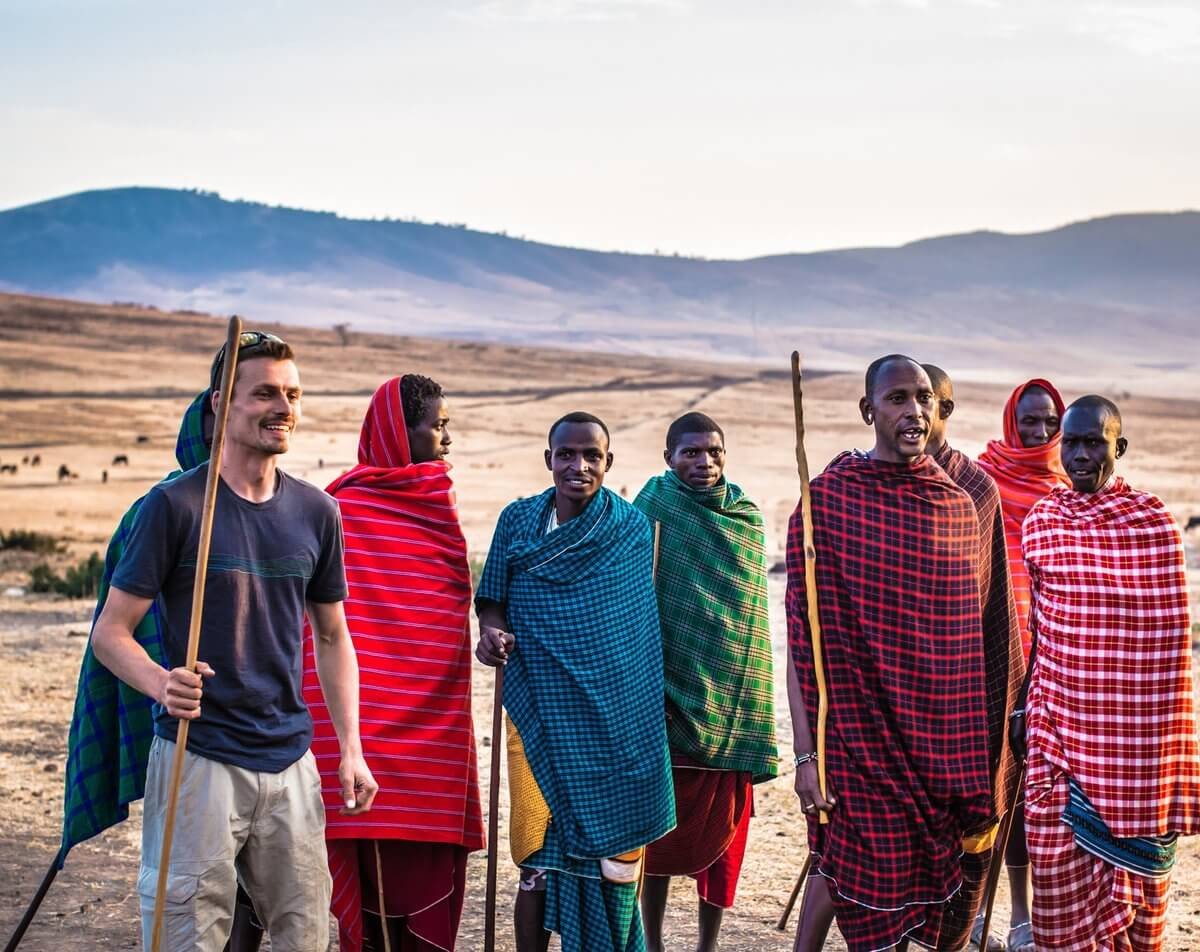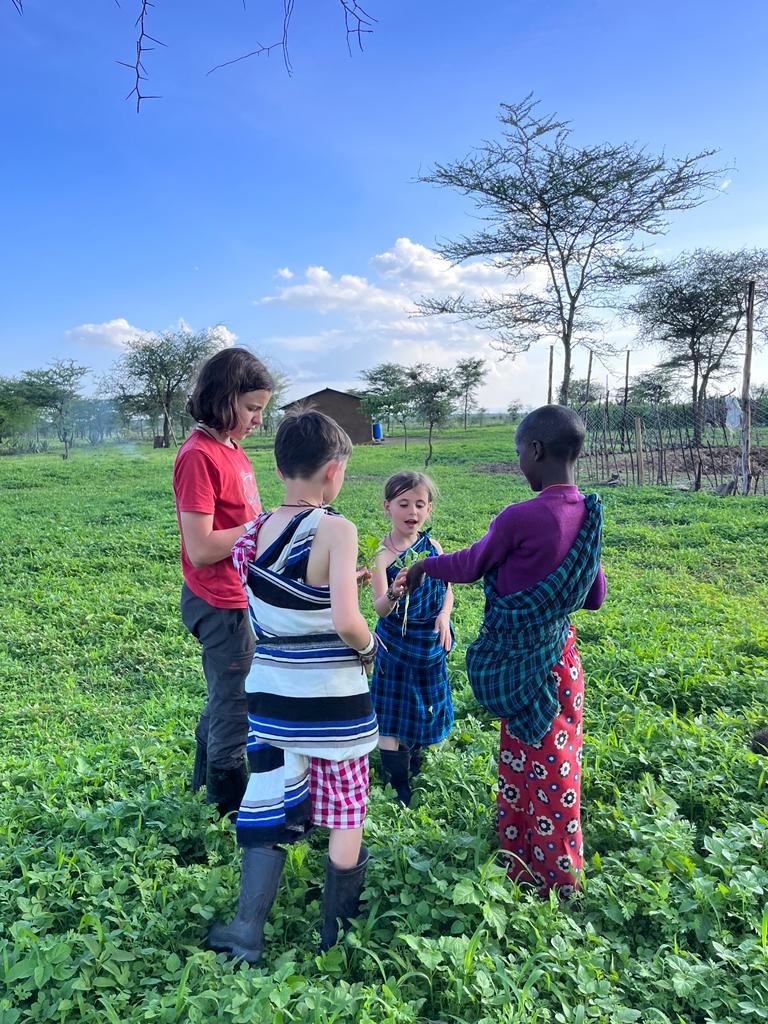To learn about the Maasai culture is one thing… but why not be a part of it! You can see the Maasai way of life up close and participate in the activities of their daily life.
During this Maasai Village Homestay, you will be welcomed to stay within their village, learn about their culture, and participate in their daily tasks. Tasks can vary though men will usually look after the tribe’s cattle while women generally take part in milking, cooking, finding firewood and taking care of children and even constructing the houses in the boma. You will also have a chance to learn beadwork with the women in the village and how to make Maasai sandals from the men! You can also teach and play with the village children.
The different tribes in Africa can have very distinct characteristics and customs. The Maasai are a proud people, who do their best to preserve their unique culture. They are quite possibly one of the most emblematic tribes of East Africa. With a Nilotic ethnic background, they live in the northern Tanzanian and southern Kenya regions. The Maasai are known for their nomadic lifestyle (although, since the ’90s, the Tanzanian government passed a bill in which they were forced to settle in a single place), their colorful dress code, their beaded jewelry, and awe-inspiring traditions.
The Maasai people’s culture, most relatives live in the same family compound, traditionally known as a boma. When they were nomadic people, they would move with their cattle from one grazing place to another. Today, these animals are still how they earn their income, through the sale of their cattle and cattle products. Interestingly, the NGO, Oxfam, claims that the lifestyle of the Maasai should be embraced as a response to climate change because of their ability to farm in deserts and scrublands.
Maasai culture can seem very different to Westerners. For example, a man can be married to several women depending on his financial status, which usually correlates to how many cattle he owns! There are actually logistical reasons for a Maasai family to have many wives, as a larger family allows more hands to take care of their cattle, cows, goats, sheep, and donkeys.
Monday
We will start the day with an introduction to the village and you will be taught useful phrases in Maasai language. You will get to learn about the lifestyle of the Maasai people through an introduction to their cultural rules, the dos and don’ts, etc.
After lunch, we will take a trek through the wilderness that surrounds the village. During this hike, you will be able to see Tanzania’s nature at its best. Visit a local caldera and enjoy the view.
Tuesday
The Maasai are a tribe well known for their herding traditions. Today, it will be all about grazing the livestock! You will join a Maasai warrior on his grazing activities through the bush – be prepared for several hours of walking!
During the dry season (June to October), this activity involves even more work: the nearest river to the village gets completely dried up, so the villagers are forced to walk further or dig holes in order to get to the water that is underground so their livestock can drink – don’t be surprised if you are invited to participate
Wednesday
In the morning hours, we will join the women of a boma in their traditional activities, you can expect to participate in activities such as milking cows, walking to the river with donkeys to fetch water, etc.
After lunch, we will join an exciting workshop in which you will be taught how to make gorgeous beaded Maasai jewelry – the kind that has made the Maasai such an emblematic and colorful tribe.
We will end the day with a cooking class led by one of our hosts. This will be your dinner, so pay close attention!
Thursday
Today is another day of grazing the livestock! Grazing days are filled with adventure as they involve long walks through the African bush.
Friday
We will take a hike through the African wilderness once again! After a few hours of adventurous roaming, we will enjoy a picnic with a view of the valley.
In the evening, we will set up a bonfire where you will get the chance to hear legendary tales about the Maasai and other stories from the village.

Duration in weeks | Registration fees |
|---|---|
2 weeks | 1050 € |
3 weeks | 1340 € |
4 weeks | 1670 € |
5 weeks | 2050 € |
6 weeks | 2330 € |
8 weeks | 3040 € |
10 weeks | 3800 € |
12 weeks | 4560 € |
A supplement of €200 applies to participants under 18. For further information, please visit the youth area.

Expect a very “back to nature” approach during your stay here! You will be staying in a very simple traditional family home in a Maasai village in Arusha, several kilometers off the main road, and quite far off the beaten track. During the dry season, the villagers have to walk several kilometers to fetch water for cooking, drinking and sometimes washing.
You will live in a house made of wood, cow dung and clay. The Maasai generally live without electricity, and although some houses have recently acquired solar panels, you should not expect them. There is no running water or western toilets. All participants are expected to be environmentally aware and to use all resources with extreme restraint, especially water, paper and electricity.
Meals are based on local cuisine and consist of corn, rice, potatoes and bananas. Beef, goat meat, beans and some green leafy vegetables add nutrients to the daily meals. There are no stores nearby, so if you feel uncomfortable with local style meals, feel free to bring extra food from Monduli or Arusha, knowing that there is no refrigeration available.
Airport pick-up on Saturday and Sunday (JRO or ZNZ) at 10am or 2pm and first night in Monduli. Volunteers arriving on Saturday will have to pay an additional fee for the first night.
Due to the remoteness of this program and limited local transportation, participants may be required to spend the first night in Monduli and travel to the village the following morning. Although the program takes place in a Maasai village in Arusha, you may be spread across multiple villages to maximize the immersive experience.
What to bring on the project:
– Clothing that covers knees and shoulders while working.
– Bring a lamp, sleeping bag and batteries as there is very little electricity on the project.
– Closed toe shoes.
– 18 years
-Intermediate level in english
– Passport copy

| | Merci pour votre abonnement |









